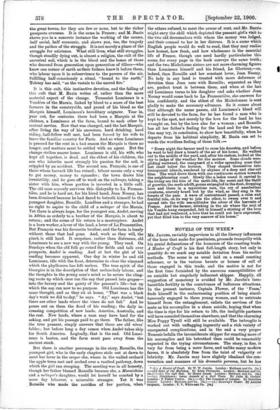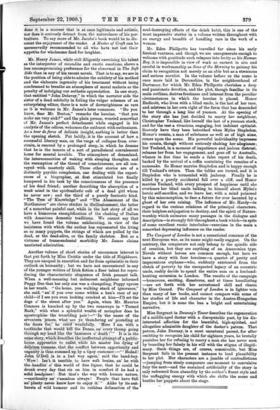NOVELS OF THE WEEK.*
MR. JACOBS, enviably impervious to all the literary influences of the hour that make for pessimism, proceeds tranquilly with his genial delineations of the humours of the coasting trade. A Master of Craft is his first full-length story, but only in quantity do we mark any notable deviation from his earlier methods. The scene is as usual laid on a small coasting schooner, or in the various haunts or houses of call of those engaged in this trade, and the motive is not for the first time furnished by the amorous susceptibilities of an amiable but singularly indiscreet skipper. Happily, all suggestion of monotony is avoided by Mr. Jacobs's inex- haustible fertility in the contrivance of ludicrous situations. In the present instance, Captain Flower, of the Foam,' finds himself in the embarrassing position of being simul- taneously engaged to three young women, and to extricate himself from the entanglement, enlists the services of the mate as his accomplice in a sham suicide, hoping that when the time is ripe for his return to life, the ineligible partners will have consoled themselves elsewhere, and that the charming Miss Poppy Tyrell will still be available. The imbroglio is worked out with unflagging ingenuity and a rich variety of unexpected complications, and in the end a very proper Nemesis befalls the inconsiderate skipper for exacting more of his accomplice and his betrothed than could be reasonably expected in the trying circumstances. The story, in fine, is very far from being a mere farce, and unlike many modern farces, it is absolutely free from the taint of vulgarity or lubricity. Mr. Jacobs may have slightly idealised the con- versation and manners of his dramatis persona, but he has
• (1.) A Master of Craft. By W. W. Jacobs. London : Methuen and Co. (es.] —(2.) Sons of the Morning. By Eden PhtlIpotte. London : Methuen and Co. [6s.]—(5.) The soft Side. By Henry James. London: Methuen and Co. Ds.] —(4.) Neighbours: being Annals of a Dull Town. By Julia M. Crottle. London : T. Fisher Cinwin. (es.)—(5.) The Conquest of London. By Dorothea Gerard. London : Methuen and Co. [68.]—(6.) Daunay's Tower. By Adellne Sergeant. London : F. Y. White and CO. EGLI done it in a manner that is at once legitimate and artistic, nor does it seriously detract from the naturalness of his por- traiture. To say more of Mr. Jacobs's book would be to dis- count the enjoyment of the reader. A Master of Craft can be unreservedly recommended to all who have net lost their appetite for wholesome food for laughter.
Mr. Henry James, vrhile still diligently exercising his talent as the interpreter of recondite and exotic emotions, shows a less uncompromising preference for the abnormal in The Soft Side than iu any of his recent novels. That is to say, we are in the position of being able to admire the subtlety of his method and the elaborate ingenuity of his treatment without being condemned to breathe an atmosphere of moral malaria as the penalty of indulging our sesthetic appreciation. In one story, that entitled "John Delavoy," in which the narrator aids the sister of a dead celebrity in foiling the vulgar schemes of an enterprising editor, there is a note of downrightness as rare as it is welcome in Mr. James's later romances. "Do you know, dear Mr. Beaten," remarks the heroine, "that you Make me very sick?' and the plain person, wearied somewhat of Mx. James's perfect detachment while engaged in his analysis of the odious, welcomes the outburst with enthusiasm. As a tour de force of delicate insight, nothing is better than the opening sketch. Put baldly, it is the account of how a successful literary man, on the verge of collapse from over- strain, is rescued by a prolonged sleep, in which he dreams that he is the inmate of a sort of paradisiacal convalescent home for mental invalids. The atmosphere of dreamland, the interconnection of waking with sleeping thoughts, and the resumption of the thread of consciousness, are all con- veyed with masterly skill. Three other stories are of a distinctly psychic complexion, one dealing with the experi- ences of a biographer, at first stimulated but finally hampered in his task by the consciousness of the presence of his dead friend; another describing the absorption of a weak mind in the spiritualistic cult of a dead girl whom he never saw; and the third of a purely fantastic kind. "The Tree of Knowledge" and "The Abasement of the Northmores " are clever studies in -disillusionment, the latter of a somewhat painful cast, while in the last story of all we have a humorous exemplification of the clashing of Italian with American domestic traditions. We cannot say that we have found the volume exhilarating, in view of the insistence with which the author has represented the living as so many puppets, the strings of which are pulled by the dead, or the dead-alive, or the family skeleton. But as a virtuoso of transcendental morbidity Mr. James claims unstinted admiration.
Another volume of short stories of uncommon interest is that put forth by Miss Crottie under the title of Neighbours. They are unequal in execution and far from optimistic in their outlook on humanity; but we have not encountered in any of the younger writers of Irish .fiction a finer talent for repro- ducing the characteristic eloquence of Irish peasant talk. When a well-meaning but indiscreet neighbour informed Peggy Dee that her only son was a changeling, Peggy uprose in her wrath. "Go home, you walking stack of ignorance," she said, "an' if you ever come within a hen's race of my child—if I see you even looking crooked at him—I'll set the dogs o' the street after yon." Again, when Mr. Maurice Connors is knocked up by the two runaways in "Turned Back," with what a splendid wealth of metaphor does he apostrophise the trembling pair !—" In the- name of -the seventeen jeuces, what are ye thundering an' pounding at the doors for,' he. cried wrathfully. Here I am with a toothache that would kill the Danes, an' every thump going through my head like the -hal:inners o' death It is in the same story, which describei the ineffectual attempt of apellic- house apprentice to enlist while his master lies dying of delirium tremens, that the conflict between opportunity and capacity is thus summed up by a tipsy customer:—" Bedad ! John O'Dell is in a bad way again,' said the band-boy. ' Wow ! Isn't it terrible to have soft brains, an' he with the landlin' o' this world of fine liquor, that he could be drunk every day that riz on him in comfort if he had a solid headpiece ! But that's the way with human nature, --eonthrairy an' r'asonleas always ! People that have full an' plenty never know how to enjoy it." Alike by its out- bursts of wild humour and its ruthless delineation of the
soul-destroying effects of the drink habit, this is one of the most impressive stories in a volume written throughout with an energy and breadth of handling rare in the work of a woman.
Mr. Eden Phillpotts has travelled far since his early farcical ventures, and though we are unregenerate enough to welcome with gratitude such relapses into levity as his Human Boy, it is impossible in view of work so earnest in aim and careful in workmanship as Sons of the Morning to gainsay his claim to recognition not merely as an able but as a strenuous and serious novelist. In the volume before us the scene is once more laid in Devonshire, in the neighbourhood of Dartmoor, for which Mr. Eden Phillpotts cherishes a deep and passionate devotion, and the plot, though familiar in its main outlines, derives freshness and interest from the peculiar circumstances in which the heroine is placed. Honor Endicott, who lives with a blind uncle, is the last of her race, and mistress in her own right of the farm that has descended to her through a long line of yeomen. At the opening of the story she has just decided to marry her neighbour, Christopher Yeoland, like herself the last of a yeoman stock, and for the rest a vivacious, engaging, but indolent optimist. Scarcely have they been betrothed when Myles Stapledon, Honor's cousin, a man of substance as well as of high aims, comes upon the scene. His powerful individuality impresses his cousin, though without seriously shaking her allegianee ; but Yeoland, in a moment of impatience and jealous distrust, releases her from her engagement, and goes off to Australia, whence in due time he sends a false report of his death, backed by the arrival of a coffin containing the remains of a namesake. So Honor marries Stapledon and is happy enough till Yeoland's return. Then the tables are turned, and it is Stapledon who is tormented with jealousy. Finally he is killed by a purely accidental fall over a cliff, and Honor marries Yeoland, with every prospect of happiness until she overhears her blind uncle talking to himself about 3fylea's heroic self-sacrifice, and we leave her, with a mind poisoned by this misconception, to face a future for ever haunted by a ghost of her own raising. The influence of Mr. Hardy—in regard to the curious relations of the principal characters, their helpless subjugation to destiny, and the spirit of Nature- worship which animates many passages in the dialogue and description—is strongly felt throughout a book which—in spite of some excellent rustic interludes--exercises in the main a somewhat depressing influence on the reader.
The Conquest of London is not a sensational romance of the next European war, as its name might easily suggest. On the contrary, the conquerors not only belong to the spindle side of creation, but they are anything of an Amazonian type. Novels without heroes are common enough, but here we have a story with four heroines—a quartet of pretty and impecunious orphans—who, suddenly extricated from the clutch of poverty by the unexpected legacy of an eccentric uncle, rashly decide to spend the entire sum on a husband. hunting excursion to London. The results of the campaign —humorous, exciting, disastrous, and at times humiliating —are set forth with her accustomed skill and charm by Miss Gerard. The Conquest of London is in lighter vein than many of her books, and cannot compare with some of her studies of life and character in the Austro-Hungarian Empire, but it is none the less a bright and entertaining narrative.
Miss Sergeant in Daunay's Tauter describes the regeneration of a middle-aged doctor with a disreputable past, by his dis- interested affection for the beautiful, high-spirited, and altogether admirable daughter of the doctor's patron. That patron, John Daunay, is a most unnatural parent, for after omitting to recognise his child for eighteen years, he brutally punishes her for refusing to marry a man she has never seen by branding her falsely in his will with the stigma of illegiti- macy. Such things are, of course, conceivable, but Miss Sergeant fails in the present instance to lend plausibility to her plot. Her characters are a jumble of contradictions —jumping from steely composure one moment to convulsive fury the next—and the sustained artificiality of the story is only redeemed from absurdity by the author's fluent style and the unflagging energy with which she shifts the scene and bustles her puppets about t,he stage.







































 Previous page
Previous page